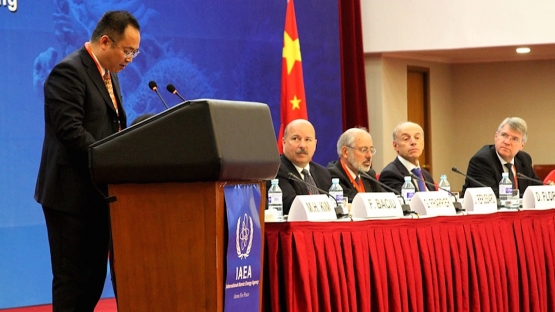Nuclear energy development, and the safety and security framework upon which it is based, requires access to a broad range of scientific and technical expertise. Qualified and appropriately trained personnel are needed by the regulatory body and the operator to help them develop safe, secure and sustainable nuclear power programmes. Currently, however, Member states – especially those embarking on nuclear energy - may not have the broad range of staffing required and therefore could rely upon Technical and Scientific Support Organizations or TSOs to provide this expertise.
This was the underlying message as the International Conference on Challenges Faced by TSOs in Enhancing Nuclear Safety and Security concluded four days of discussions on 31 October 2014. Some 240 participants from 42 Member States and 5 organizations attended the conference, which was organized by the IAEA and hosted by the Government of China in Beijing.
The focus of the conference was to strengthen cooperation among TSOs and improve their capabilities to provide nuclear and radiation safety and security expertise to both regulators and operators. Its overall aim was to assess and review ways to further improve the effectiveness of TSOs, also taking into account lessons learned from the Fukushima Daiichi nuclear accident.
In his summing up, Benoit De Boeck, President of the Conference, and General Manager of BEL V, Belgium, noted the good progress that had been made since the last TSO Conference in Tokyo in 2010. Ongoing challenges remain, he noted, particularly in building capacity for Member States embarking on nuclear power development programmes. But there are also future opportunities for networking and cooperative research and development in several key technical areas, such as: decommissioning, remediation, human and organizational factors, safety analysis and predicting severe accident progression. However, there is also a widely shared concern that developing and maintaining these TSO opportunities is not always (or may not be in the future) adequately resourced by Member States.
The conference noted that the decisions underlying nuclear safety and security regulations are technically complex and science-based . Thus it is virtually impossible for the regulatory body to internally develop, resource, manage and staff the scientific research and development functions needed to sustain them. In addition, De Boeck emphasized that: "Member States should ensure the availability of adequate and sustainable financial resources to maintain TSO capacities.”
“In light of the Fukushima accident and the momentum that the IAEA Action Plan on Nuclear Safety has created among Member States, TSOs must continue to be one of the driving forces to pursue this effort,” De Boeck said.
De Boeck further called for the IAEA "to provide a Safety Guide on the performance of the TSO functions.”
In his closing remarks, Z. Li, Conference Co-President and Director General of the Chinese Nuclear and Radiation Safety Center (NSC) said the decisions taken during the previous two TSO conferences have contributed to highlighting the vital role of TSOs in ensuring the effectiveness of nuclear safety and security which, in turn, directly influences the development of the nuclear industry and strengthens the national technical capacity in nuclear safety. He also stated that NSC, will actively support the collaboration of Asian TSOs to jointly establish the Asian Technical Safety Organization Network under the guidance of the IAEA and promote the integration in a global TSO network with the European Technical Safety Organisation Network (ETSON).
Mr. Denis Flory, IAEA Deputy Director General of the Department of Nuclear Safety and Security, stated in closing: "This Conference addressed challenging issues and many proposals for the future were expressed and discussed. From the IAEA Secretariat, I can assure you that we shall take on board our part of the implementation of the actions identified to fully support all TSOs worldwide."
The next TSO Conference was proposed to take place in 2018, and to be hosted by the Government of Belgium.
Background
The objectives of this conference were to assess and review ways to further improve the effectiveness of TSOs taking into account lessons learned from the Fukushima Daiichi nuclear accident. In particular, the conference:
• Discussed the role of research and development in enhancing nuclear safety;
• Helped participants to understand the impact of the Fukushima Daiichi accident on TSOs and to extract lessons to be learned;
• Highlighted the role of TSOs in the implementation of the IAEA Action Plan on Nuclear Safety;
• Provided a forum for discussion of the roles, functions and value of TSOs in enhancing nuclear and radiation safety and nuclear security, including through capacity building in those countries launching or expanding their nuclear power programmes;
• Facilitated the exchange of experience and good practices in planning and implementing cooperative activities for capacity building and in identifying needs for assistance activities from the standpoint of recipient countries;
• Considered appropriate approaches for enhancing cooperation and effective networking among TSOs and beyond, including centres of excellence;
• Provided an overview of the technical and scientific support needed for maintaining a sustainable nuclear safety and security system; and
• Fostered continued dialogue on all relevant technical, scientific, organizational and legal aspects at the international level.


